 Culture & Ethics
Culture & Ethics
 Evolution
Evolution
 Intelligent Design
Intelligent Design
Dogs Aren’t Human: They Are Dogs

National Geographic often carries stories that explicitly or implicitly seek to undermine human exceptionalism. The magazine has now published another story claiming that animals are people too.
This time, it is dogs. From “Dogs Are Even More Like Us Than We Thought“:
Dogs can read facial expressions, communicate jealousy, display empathy, and even watch TV, studies have shown. They’ve picked up these people-like traits during their evolution from wolves to domesticated pet, which occurred between 11,000 and 16,000 years ago, experts say.
Dogs did not “evolve.” Evolution presupposes randomness and purposelessness.
That isn’t what happened with dogs. They were intelligently designed by us to serve our needs for companionship and other utilities. Thus, whatever human-like attributes we want to read into them are due to us — not natural selection. Animals are changed by their association with humans. That is one of the exceptional things about us.
Indeed, dogs may be humankind’s greatest invention. That’s a very good thing. They are intense producers of pure love and joy.
Cross-posted at Human Exceptionalism.
Image by Sannse at the English language Wikipedia [GFDL or CC-BY-SA-3.0], via Wikimedia Commons.
